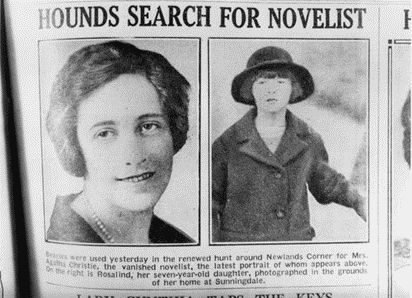Today’s
blog draws on a mix of fictional and true-life cases of a rare form of amnesia
that has no physical cause—dissociative fugue. You may already be familiar with
this form of memory loss. The terms “shell-shock” and “battle fatigue” were coined
during WWI and WWII, respectively, to describe soldiers who cracked under the
horrors of war and wandered away from the battlefield confused and foggy,
unable to remember who they were, or where they were. These soldiers were often
reported as AWOL or MIA. The lucky ones regained their memory and found their
way back to their units, or were recovered by their comrades or MPs, before
they could be captured or killed by the enemy.
Dissociative fugue, as a mental health disorder, is triggered by severe psychological trauma or post-traumatic stress (PTSD). It serves as a shield from memories too painful to keep in conscious memory, and thus, is classified as a psychological defense mechanism. Just like battle fatigue, the condition leaves sufferers stupefied, muddled, and wandering, their minds empty of any personal memories or identity. Typically, this form of amnesia is temporary, lasting no more than hours or days. Sufferers usually snap out of it without any memory of what they did, where they went, or the people with whom they interacted.
Disoriented—as if in a daze or fugue—he stumbles to the deck of the yacht, where he is shot by the man’s guards. He plummets overboard and is left adrift in the ocean, until he is rescued by a fisherman. He wakes without a single memory to his name, which is not Jason Bourne—that is just one of many his cover aliases he used in his job. Over the course of three books and five films, his memory slowly emerges, until one day everything comes rushing back—his true name (David Webb), his past, and every memory he had before being shot.
Although some suggest the Agatha Christie faked her fugue state—perhaps as a way to get back at her husband, or simply for the publicity—there is evidence that she genuinely lost her memory. On the cold evening Agatha disappeared, a witness encountered her walking down the road, appearing confused and upset, and clad in nothing but a thin dress. It’s been theorized that Agatha, suffering from depression from her impending divorce and her mother’s recent death, entered into a fugue state after crashing her car. She then wandered off leaving behind her memories and the distress associated with them. The truth died with Agatha fifty years later when she passed at age 86.
Suppose you were like Agatha, and you woke up to find yourself in a wonderful spa, far away from home with no recollection of who you are and no one to vouch for your identity—what stressful situation would have driven you to mentally escape your life? And more importantly, what would it take to snap you out of your fugue?




Fascinating stuff. And a very interesting question, for which I have no current answer. I need to think about it...and maybe I'll come up with a new story plot while I'm at it.
ReplyDeleteAmazing how real-life events inspire our own storytelling.
DeleteI have no clue what I would do in that situation. Probably panic and start looking for clues.
ReplyDeleteYup, I'm with you on that. In fact, as a pantser, that's the approach my protagonist took in my debut psychological thriller, "Lest She Forget."
DeleteHard to say what might cause me to go into such a state. Although I have a feeling that I would be far more likely to wake up in a dark urban alley than in a luxury spa if it should happen.
ReplyDeleteOoooh! A dark urban alley! Maybe you have a story waiting to get out ....
DeleteI might be tempted to go with the flow! In my case, I suspect it would be a cascading of events. I am a strong woman, having grown up in a family that put the fun in dysfunctional so I’m accustomed to dealing with individual blows. There may come a time when multiples would be overwhelming. What would it take to snap me out of it? A sense of safety and security, be it from other people or my surroundings. Hum….bring on the spa!
ReplyDeleteI think I'd try to enjoy the spa first and because I'm in the South, "Think about this tomorrow."
ReplyDeleteYes, Debra (or should I call you "Scarlet"?), "After all, tomorrow is another day."
DeleteMakes for an intriguing story.
ReplyDeleteGrace Topping
Yes, Grace, that's what I thought when I started writing "Lest She Forget." It was fun to write all the twist and turns my protagonist encountered as she struggled to overcome the personal demons keeping her memory in prison. The reviews have raved about the intrigue, too!
DeleteThis comment has been removed by the author.
ReplyDeleteThanks, Lisa, for the really interesting information about amnesia. I wish I could be selective on what I couldn't remember.
ReplyDelete